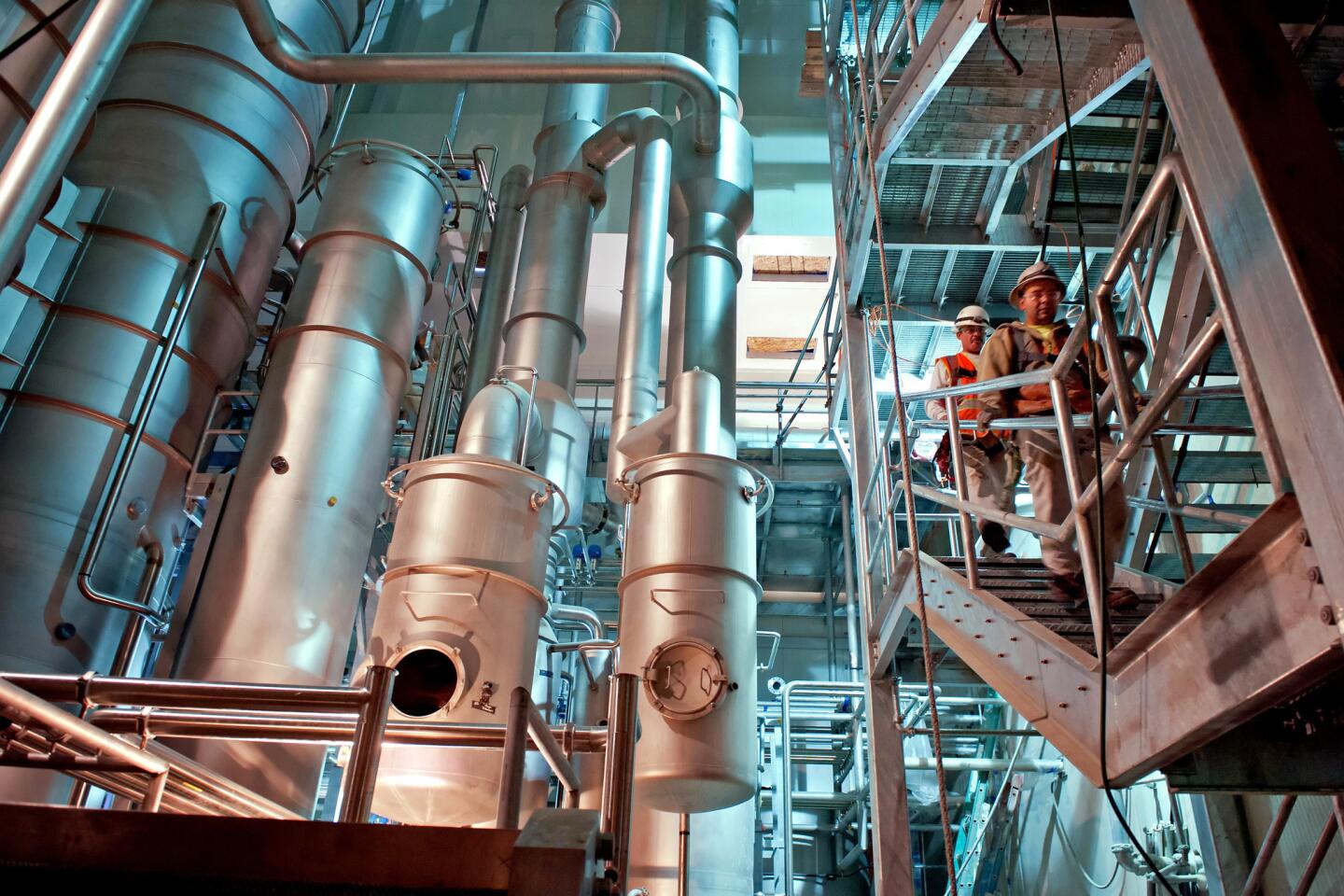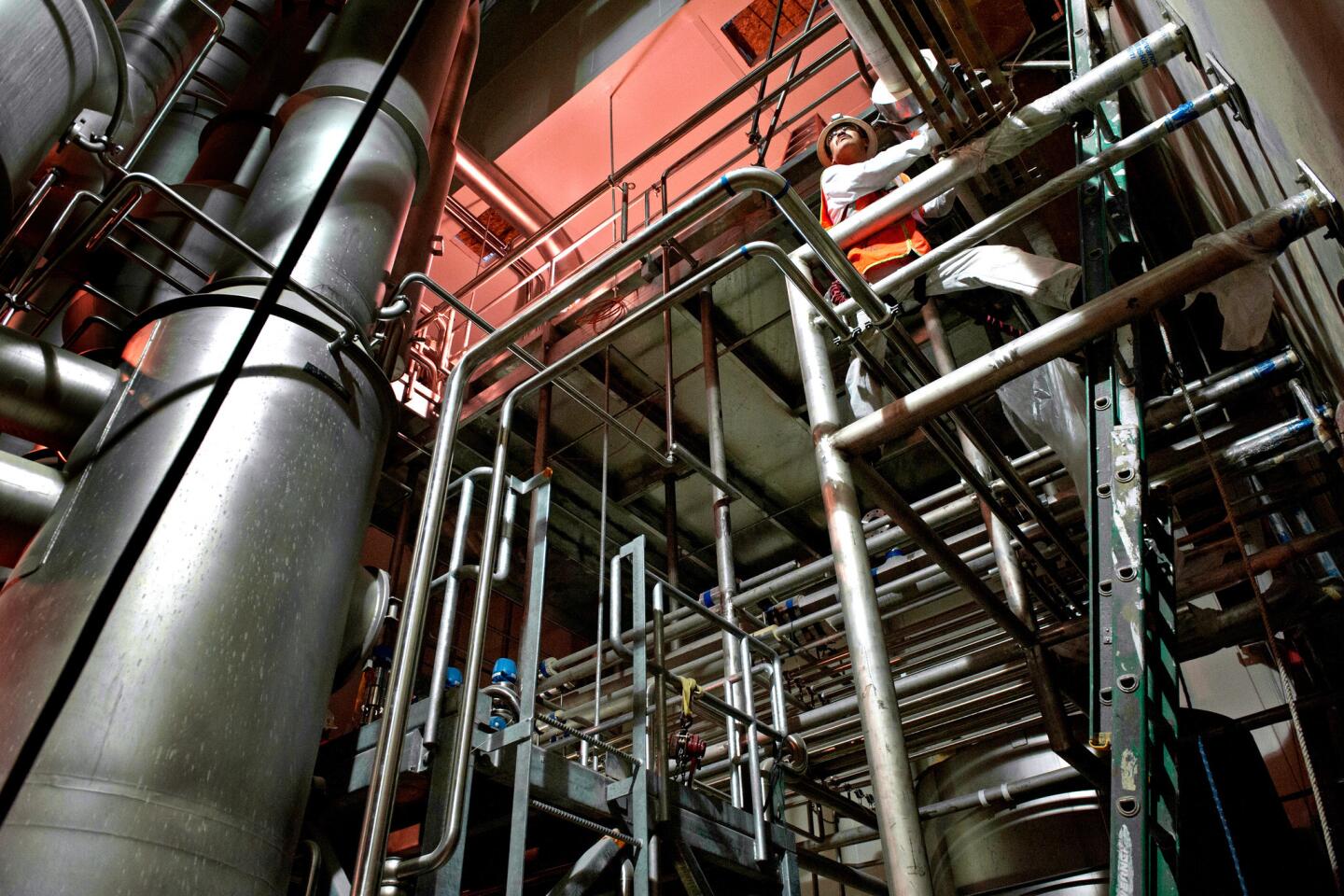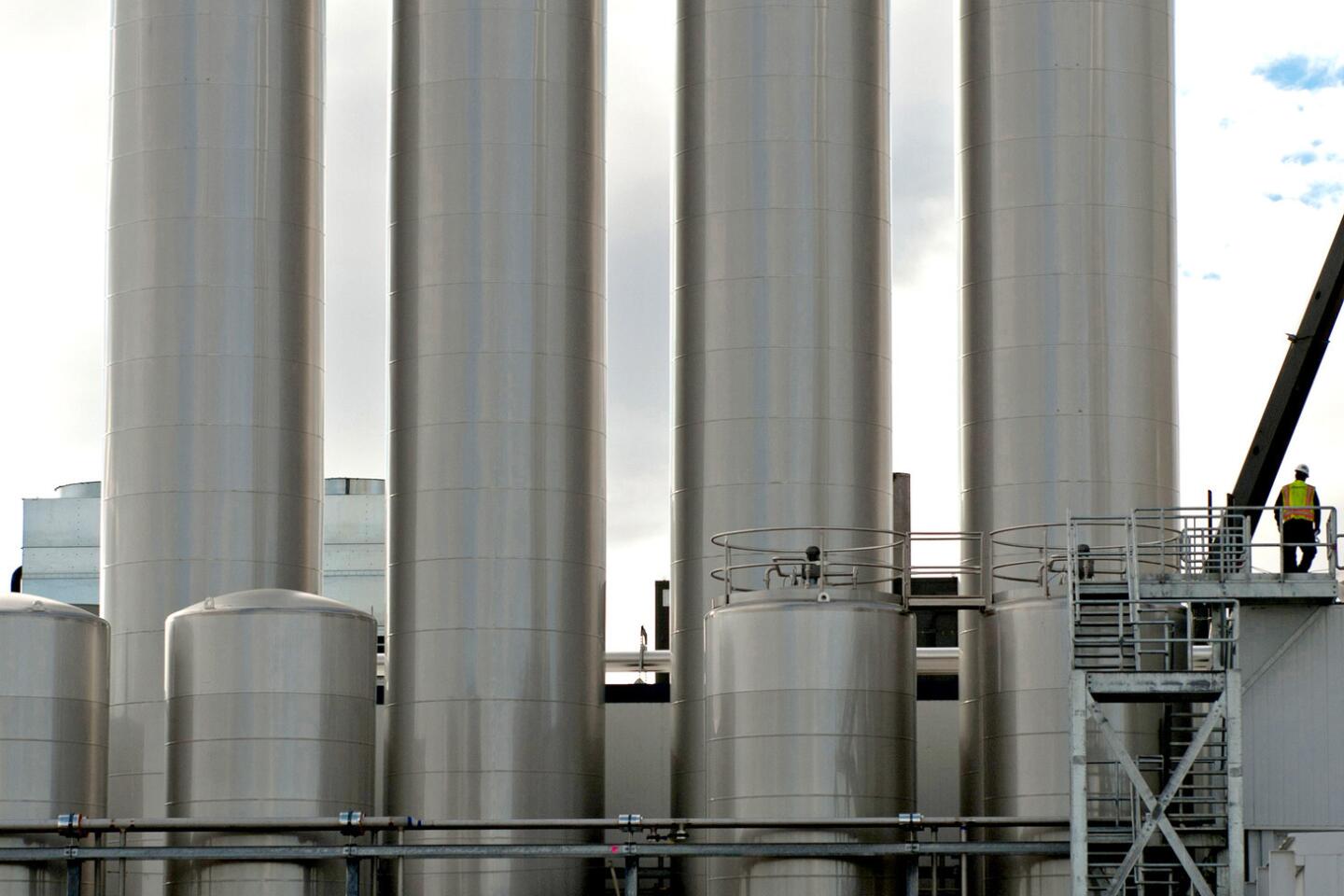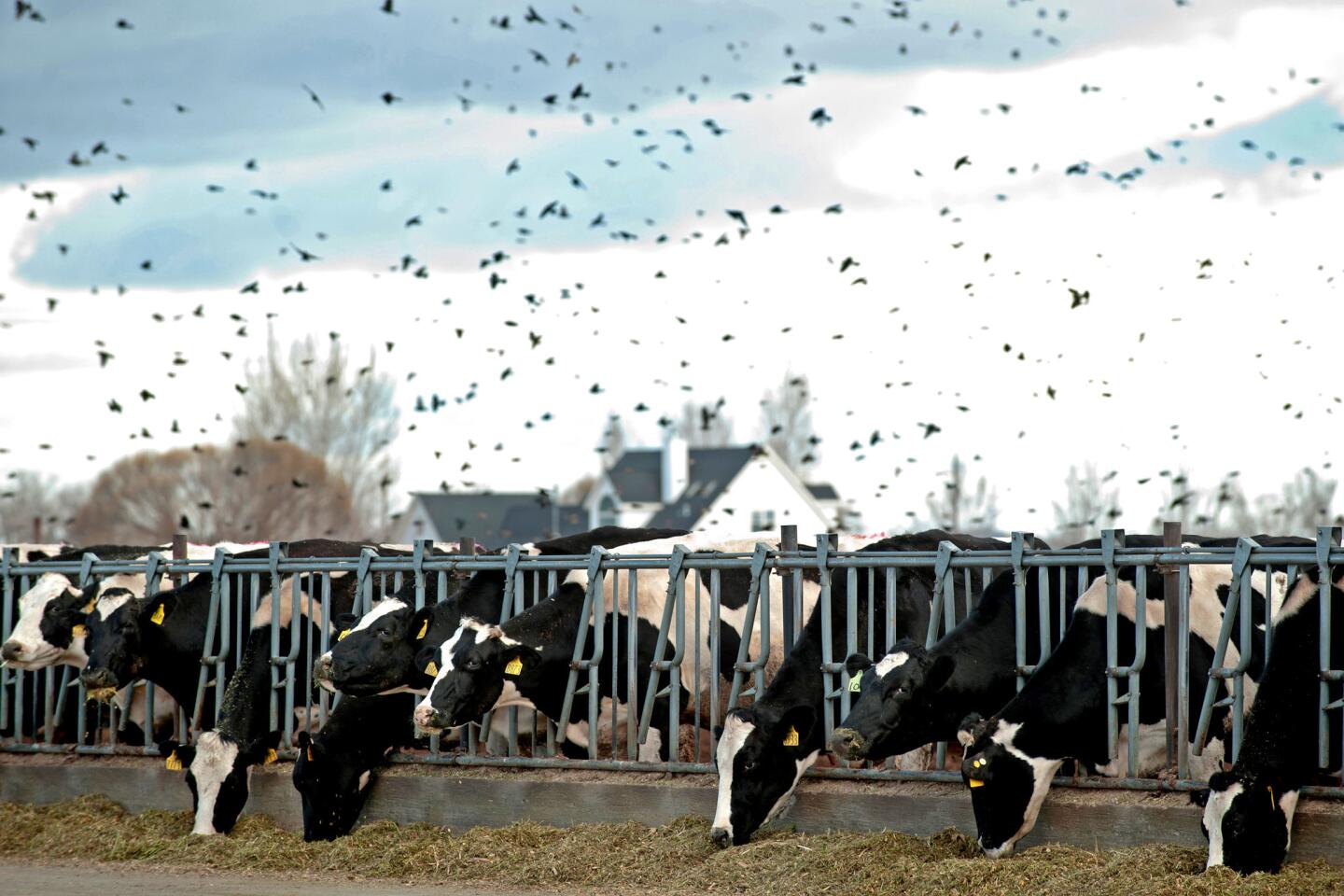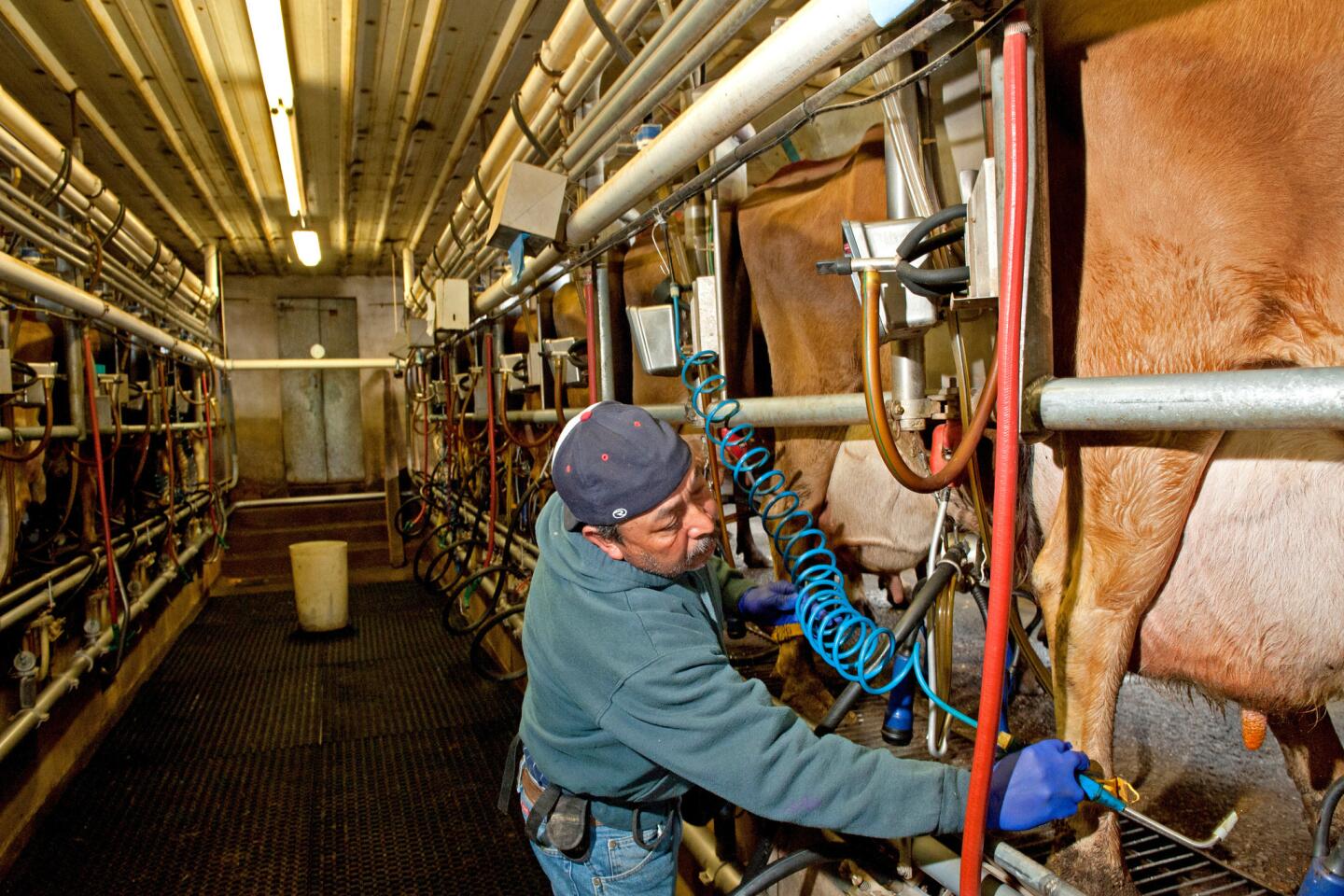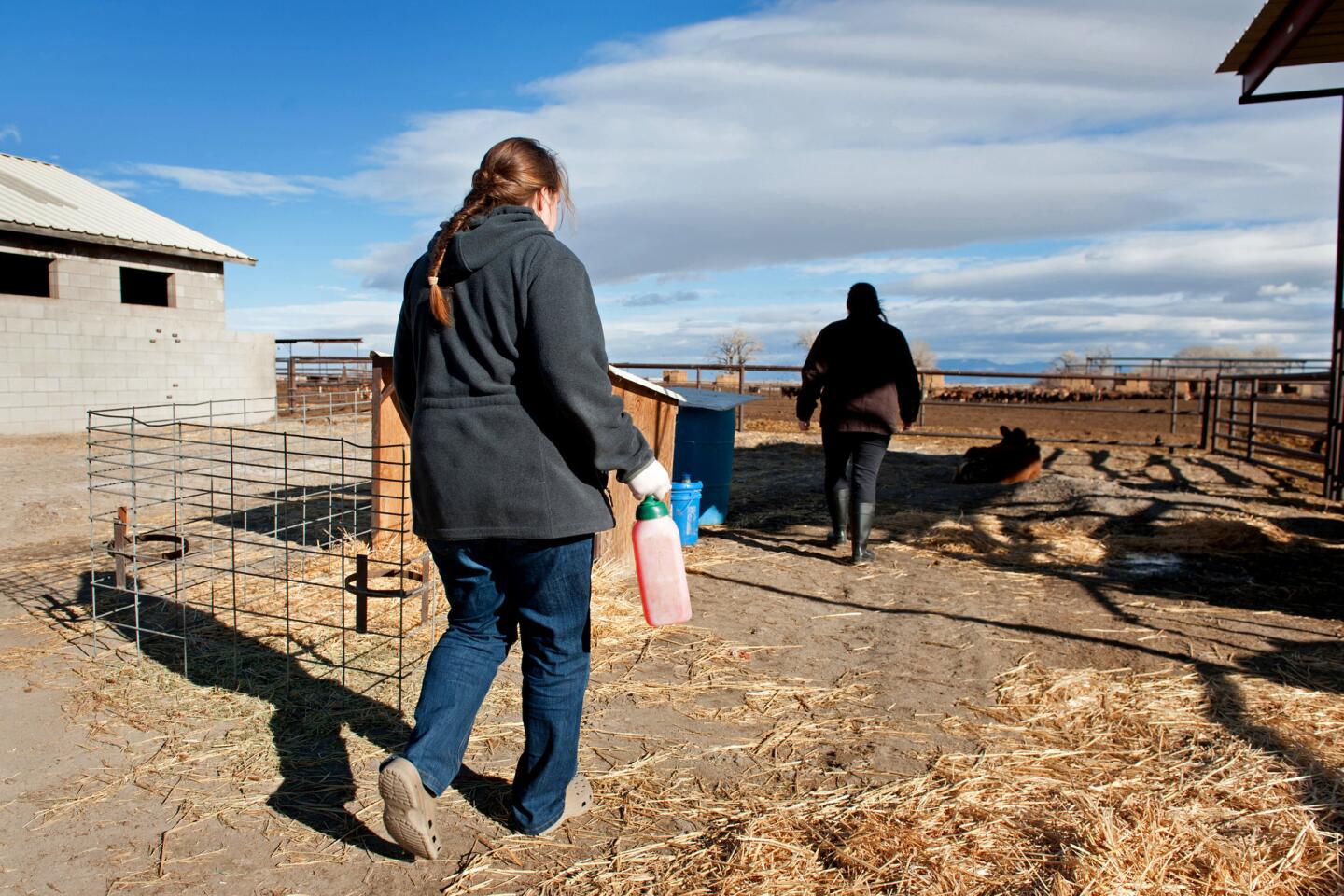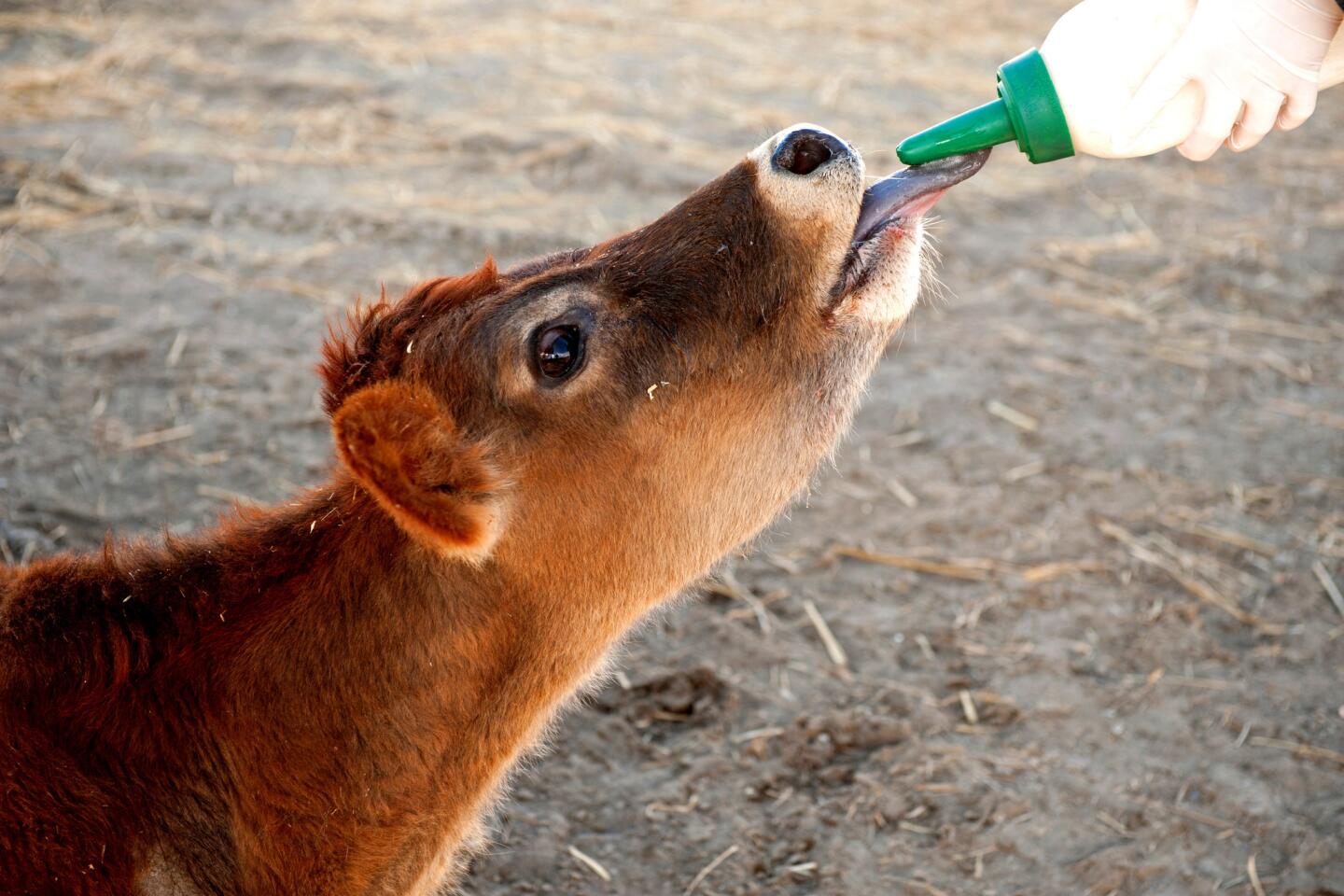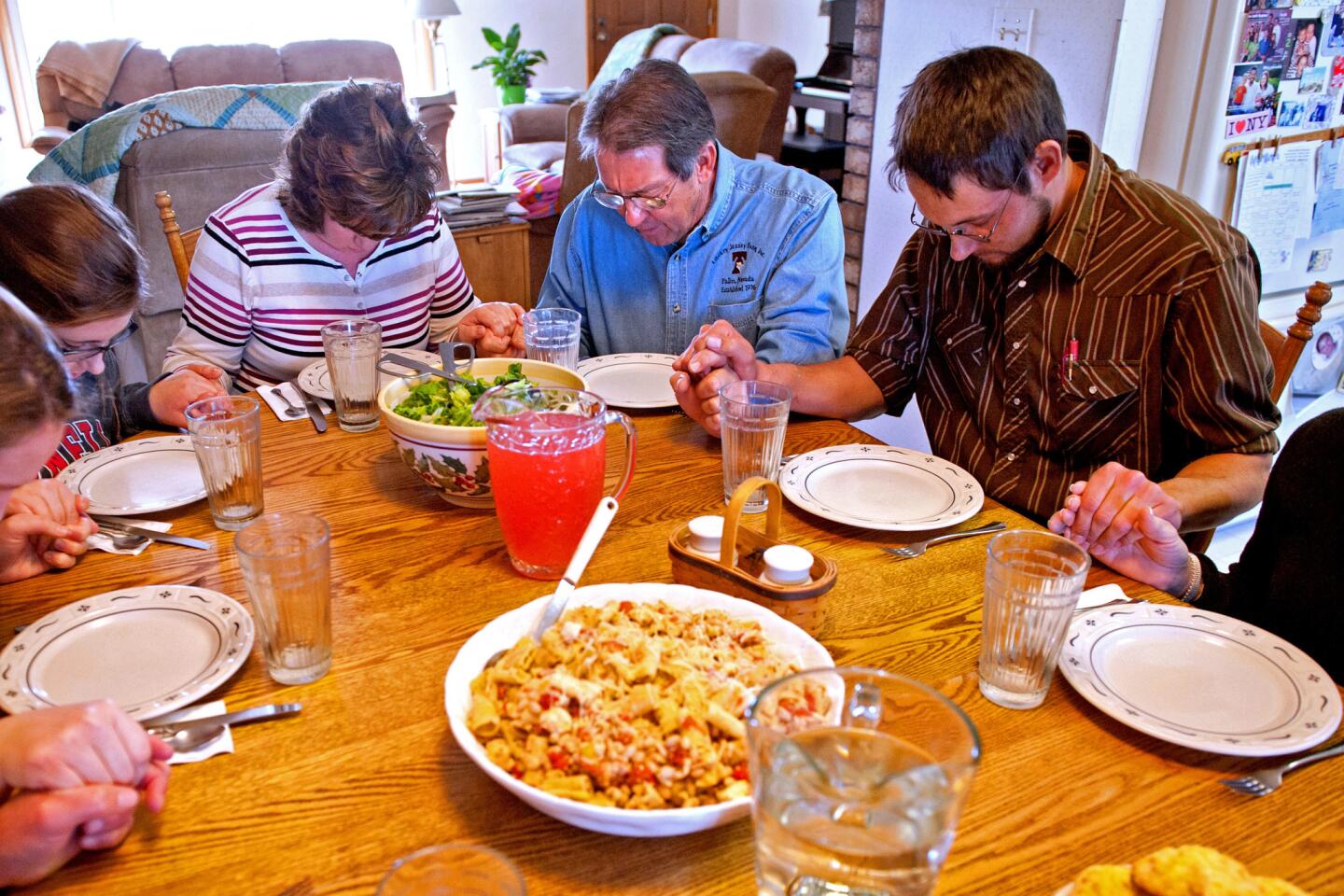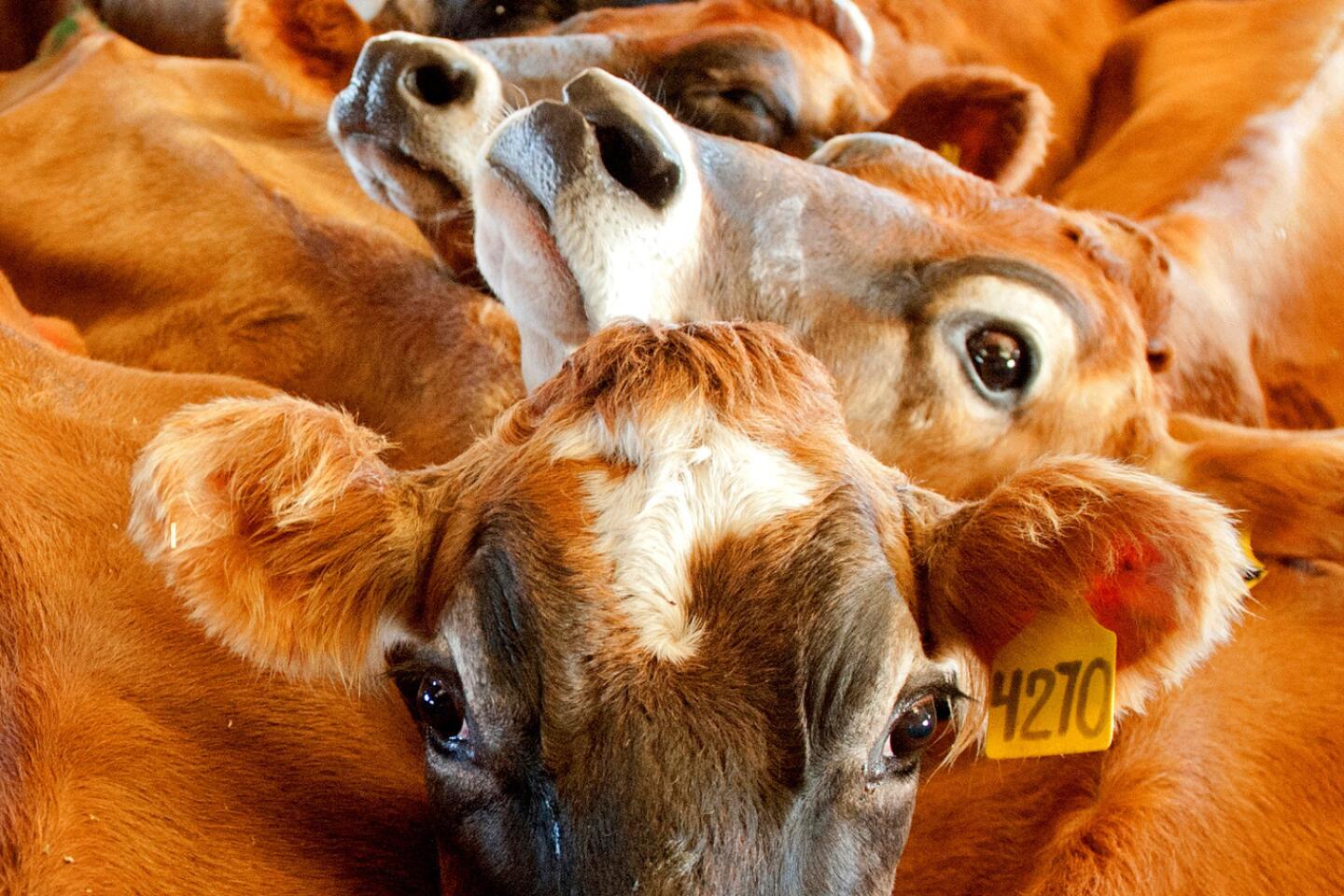China’s thirst for milk gives U.S. dairy farms a boost
- Share via
FALLON, Nev. — The dairy plant with its tangle of stainless steel pipes rises out of the parched landscape here like a beckoning oasis.
Perched on the outskirts of this desert town dotted with small churches and roadside casinos, the factory represents a potential lifeline for nearly two dozen nearby dairy farmers.
In a few weeks, every drop of milk collected from the surrounding farms will be brought to the plant and converted into fine powder inside a towering heating chamber specially made for the $85-million facility.
But instead of being delivered to U.S. stores, the milk powder will be trucked nearly five hours away to the Port of Oakland and then loaded onto ships to China in bags emblazoned with the American flag.
It’s all part of a plan to claim a foothold in a country whose growing thirst for milk is shaking up almost every corner of the global dairy industry — even remote communities such as Fallon, 60 miles east of Reno.
“It’s the global economy being brought home to a small city in western Nevada,” said Bob Shriver, Fallon’s director of economic development.
Rising incomes and a burgeoning appetite for richer protein has led to a boom in Chinese milk demand that can be quenched only with more foreign supplies.
China is the world’s top dairy importer. Revenue in the country’s dairy market reached $40 billion last year, a fivefold increase from a decade ago, according to market research firm Euromonitor.
Some of the biggest demand is for milk powder such as the kind to be produced in Fallon, starting next month. Parents in China depend heavily on powdered milk to deliver protein and calcium to infants and young children. Breast feeding is unpopular, and fledgling distribution networks mean the availability of cold, fresh milk is limited.
Many Chinese parents hesitate to give their children domestically produced formula. They remain wary after a 2008 scandal in which milk laced with the chemical additive melamine killed at least six children and sickened 300,000. Subsequent safety lapses have done little to restore faith.
“We don’t trust Chinese brands,” said Zhang Jun, 27, a Beijing father who buys French formula to feed his infant daughter. “We fear our children will be sick if they take melamine-tainted milk.”
That has opened opportunities for foreign producers to peddle their dairy products to Chinese consumers at a premium price. Germany, New Zealand and France have ramped up production. Now the United States is getting into the act.
With U.S. dairy consumption flat, American dairy exports are growing at a record clip. Shipments to China alone grew to $706 million last year, up from $137 million in 2009, according to the U.S. Dairy Export Council in Virginia.
Overseas demand is driving up milk prices in U.S. supermarkets. The average retail price for a gallon of whole milk was $3.55 in January, the highest in more than a year. Wholesale prices for milk used to make cheese hit a record high in February at $23.35 per hundred pounds. That trend could continue as dairy farms struggle to increase production amid one of the nation’s worst droughts.
“There’s fresh demand from regions of the world that haven’t traditionally been dairy consumers,” said Eric Meyer, president of the dairy division of HighGround Trading Group, a Chicago brokerage firm. “So you either build more capacity or you continue to have high milk prices.”
Those new international markets are helping change the fortunes of U.S. farmers, including those in Fallon, a city of 8,500 in the Lahontan Valley that has been favored by generations of dairy farmers for its mild winters and cool summer nights.
Dairy farmers here have long trucked their milk to processors in California. But they were unsure how long that would last. The California Milk Advisory Board promotes a “Real California Milk” marketing seal that could one day exclude producers around Fallon.
“We basically have been functioning in a system where we were one call away from being out of business,” said Bill Christoph, who operates Liberty Jersey Farm in Fallon.
In 2011, the Dairy Farmers of America, a national cooperative with 13,000 members, floated the idea of building a milk powder factory in Fallon for exports.
The organization, based in Kansas City, Mo., had been exploring the idea for years. In 2007, it hired Jay Waldvogel, formerly an executive at New Zealand dairy giant Fonterra, to lead its international business development.
Waldvogel linked the Dairy Farmers of America to Chinese buyers and helped find a New Zealand firm to design the whole-milk powder facility, the likes of which had never been built in the United States.
“The problem in China is they’ve got 22% of the world’s population but only 7% of its farmable land,” Waldvogel said. “They have to make a conscious choice about what to grow and what to import. If it’s a choice between pork, corn and dairy, I think dairy falls pretty low. It’s more efficient to buy milk produced in the U.S.”
That hasn’t stopped China from furiously trying to scale up. Chinese dairy brands are buying tens of thousands of cows from New Zealand, Australia and Uruguay. China imported 300,000 metric tons of alfalfa hay from the U.S. last year, largely to feed the dairy herds.
Private equity firms such as Carlyle Group and Kohlberg Kravis Roberts & Co. also have been buying stakes in Chinese dairy companies and investing in technological upgrades.
Still, analysts at agricultural lender Rabobank estimate imports will continue to account for one-fifth of China’s total dairy supply in the coming years. “For exporters to China, the window for trade opportunity is likely to remain wide open for some time,” the bank said in a research report.
That shortfall in supply is one of the reasons for a thriving black market in China. Tourists from China have been known to visit supermarkets and buy up shelves’ worth of formula to send back home.
Purchase limits aimed at the travelers were introduced in Australia and Britain. Export quotas were issued in Hong Kong, whose border with mainland China often teems with milk powder traders and smugglers stashing tins in their suitcases.
Although major U.S. formula makers such as Mead Johnson and Abbott Laboratories have had success in China, their milk powder doesn’t come from a dedicated American facility like the one in Fallon, said Alan Levitt, a spokesman for the U.S. Dairy Export Council.
“This is a game-changing plant. This is the first explicitly designed for export,” Levitt said.
The Dairy Farmers of America settled on Fallon because of its nearby dairy base and tax incentives from the Nevada governor’s office. Workers broke ground on the factory in August 2012.
Officials from Yili Group, one of China’s three biggest dairy companies, traveled to the U.S. the following year to iron out the first deal for the plant’s milk powder.
They returned last January and met with Fallon Mayor Ken Tedford, toured a dairy farm, ate sandwiches and downed tall glasses of cold milk.
“Getting your milk from America is like the Good Housekeeping seal of approval to them,” Tedford said. “We take that for granted.”
The new plant will create 45 full-time jobs in the city. It also could provide a boost to as many as 2,000 alfalfa farmers, veterinary services workers, drivers and others in related fields within a 90-mile radius of Fallon, city officials said.
Yili, based in China’s Inner Mongolia region, has been trying to increase its stocks of foreign dairy products. It was marred by the 2008 melamine scandal and had to issue a recall as recently as 2012 for some infant formula that was found to contain high levels of mercury.
Longtime Fallon dairyman Pete Olsen said it was quickly apparent how important food safety was to the Yili executives.
“The first words out of their mouths were, ‘How often do you test for heavy metals in your milk?’” said Olsen, whose family has been milking cows in Nevada for nearly 100 years. “I was blown away. I had to explain that doesn’t happen here. They have problems we don’t even have to think about.”
The milk powder factory stands on 40 acres of old pasture land not far from Fallon’s town center. Billboards greet visitors with the 10 commandments, and F-18 jets from the Navy’s “Top Gun” fighter academy nearby occasionally dart across the skies.
The factory is designed to process 40 tanker truckloads of milk a day. The fluid will end up pumped through high-pressure nozzles into a heating chamber that looks like an inverted Apollo spacecraft. So fine is the spray from the needle-sized nozzles, partially evaporated milk is instantly converted to powder as it’s jettisoned into the 400-degree crucible.
The powder can be used for infant formula or mixed into ultra-high-temperature processed milk or yogurt.
Christoph of Liberty Jersey Farm said he welcomed the new plant because it would save the cost of transporting his milk to California. Since the 2008 financial crisis, dairymen like him have been battered by feed costs that have more than doubled and wholesale milk prices that were slashed in half.
If all goes well, it could give Christoph a chance to expand his operation by about 50 animals. For two decades, it has been run as a small family farm; Christoph’s three children doled out names like Tootsie and Tulip to their favorite bovines.
“We haven’t been very large, and this could give us the opportunity we need,” said Christoph’s 24-year-old son, Ted, a recent graduate of Cornell University with a degree in animal science.
Although Christoph may never meet any of the parents thousands of miles away who will buy his milk, he wants to assure them of his product’s safety.
“This is a stewardship,” said Christoph, 62. “It’s not only a financial obligation but a moral one. That’s what we do here. That’s why our cows get the best possible care.”
Nicole Liu in The Times’ Beijing bureau contributed to this report.
More to Read
Inside the business of entertainment
The Wide Shot brings you news, analysis and insights on everything from streaming wars to production — and what it all means for the future.
You may occasionally receive promotional content from the Los Angeles Times.
